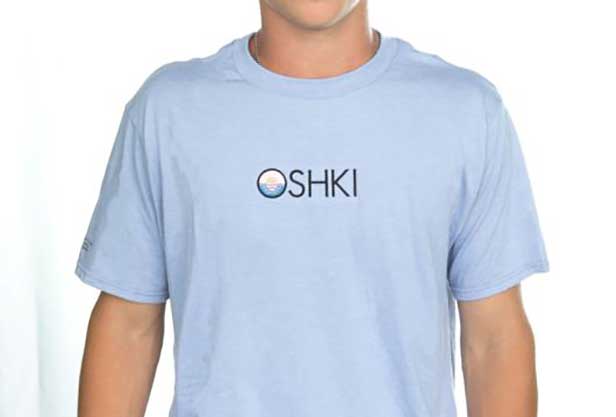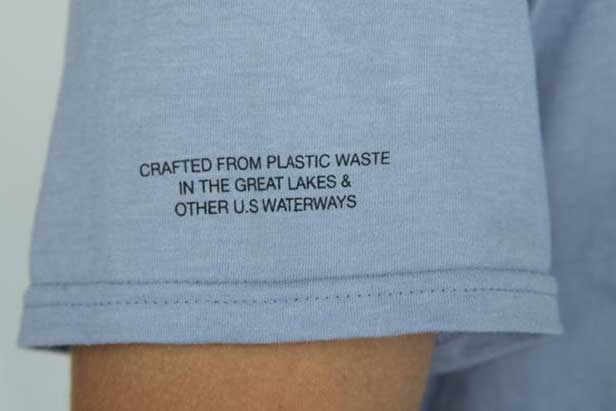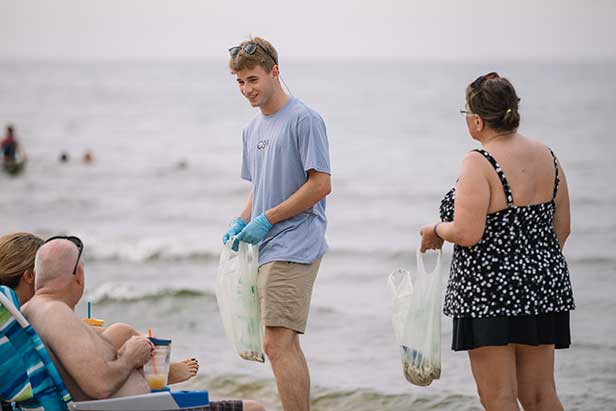Product Hub February 24, 2020
College Student Builds Sustainable Apparel Brand
Oshki apparel is made in part from plastic waste taken from the Great Lakes.
A University of Michigan sophomore is using his budding business skills to grow his apparel brand – and help clean up the Great Lakes. Jackson Riegler started Oshki (which means “fresh” in Native American language Ojibwe) while he was still in high school.
“I’ve always been super passionate about the Great Lakes,” says Riegler, who grew up in Muskegon on the shores of Lake Michigan.


Oshki sells apparel made, in part, from plastic waste taken from the Great Lakes.
Riegler founded his company in 2017 when he was just 17, after being angered when the Trump administration proposed to slash funding to improve and protect the Great Lakes. Though those cuts never went through, they ignited a spark in Riegler, who vowed to donate 5% of his sales to nonprofits working to preserve the lakes. In that first year, Oshki was able to give more than $1,100 to those nonprofits, according to Riegler.
At first, Riegler worked with local screen printers, who printed Oshki’s designs on imported tees, but once he started college, he decided to overhaul his business, creating a more sustainable supply chain that sourced recycled materials entirely from the U.S.
“It’s something more unique that not many people do,” he says. “A lot of companies that claim to be sustainable, they source from all over the world. … They don’t take into account the amount of carbon emissions that produces.”
Oshki shirts are made in part from plastic waste taken from the Great Lakes and transformed into polyester fiber at the Repreve plant in Yadkinville, NC. The company also works with Vapor Apparel (asi/93396) in Hanahan, SC, and a textile manufacturer in Lakewood, CA. The company sources vinyl stickers from New York City; sustainable packaging from Ecoenclose in Louisville, CO; and hangtags and packaging postcards from Uprinting in Los Angeles.
“It certainly wasn’t an easy task,” Riegler says. “I spent the majority of my freshman year creating this supply chain, but something very encouraging was how willing the people I met along the way were to help.”
The US recycling crisis that came after China started restricting imports of some plastics and other recyclables in 2018 also helped to boost Riegler’s fledgling business. “It paved the way for people like me to reuse that plastic in a new way,” Riegler says.

Jackson Riegler, founder of Oshki, leads a beach cleanup on the shores of Lake Michigan.
In addition to selling recycled apparel online, Oshki sponsors beach cleanups. More than 22 million pounds of plastic pollution ends up in the Great Lakes each year, according to the Rochester Institute of Technology. Each cleanup yields around 75 to 100 pounds of recyclable plastic waste. Riegler hopes to intensify the beach cleanup efforts in the coming months. He already has volunteers in 10 cities around the Great Lakes who have committed to holding three Oshki cleanups this summer, and he’s hoping to increase that number. “We want to get to the point where 100% of the recycled polyester in our shirts comes from our cleanups,” Riegler says.
He’s also planning to expand his offerings, moving beyond T-shirts to add leggings and board shorts to Oshki’s product lineup.
Rethinking Oshki’s supply chain has already led to growth for the new apparel company. In its first two years, the brand has brought in about $83,000 in revenue, Riegler says. Over the next year, he’s projecting to do $100,000 in sales. “We’re definitely growing pretty fast,” he adds.

Product Hub
Find the latest in quality products, must-know trends and fresh ideas for upcoming end-buyer campaigns.
